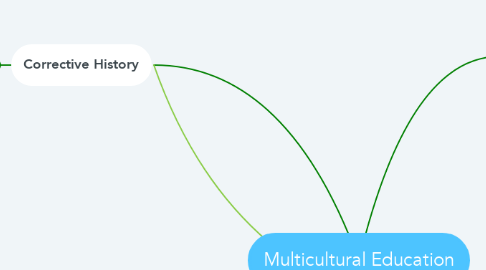
1. Corrective History
1.1. No longer privileging European perspective
1.2. Including perspectives that have been omitted or distorted
1.3. Going beyond the Simplification of Differences
1.3.1. Multicultural education taught through the lens of "tolerance" or "celebration" does not...
1.3.1.1. address racial tensions
1.3.1.2. engage students in critical examination of learning
1.4. (Ngo, 2010 and Gorski, 2006 and Wiggan & Watson-Vandiver, 2019)
2. Assets Based
2.1. Draws on the strengths of participants
2.1.1. Leads to self knowledge
2.1.1.1. Language validation
2.1.1.2. positive self-identity and group identity
2.1.1.3. self-affirmation
2.1.2. mitigates cultural mismatch - when teachers undermine or misunderstand students' home cultures
2.1.3. Cultural pluralism
2.1.3.1. Embrace culture characteristics of marginalized groups
2.2. Promotes critical connections
2.2.1. Challenge racist, sexist, ethnocentric perspectives and practices
2.3. Classrooms as learning labratories
2.3.1. Enrich the learning environment by incorporating the unique experiences of students
2.4. (Ngo, 2010 and Gorski, 2006 and Wiggan & Watson-Vandiver, 2019 and Sealy-Ruiz, 2007 and Jocson, 2008)
3. Theory to Practice
3.1. Uncritical practices leads to skepticism
3.2. When disconnected from an equity framework teachers become "one-dimensional multicultural technicians"
3.3. Assign reading and coursework that are relevant to the students lives
3.4. Give opportunities to discuss aspects of their culture
3.5. (Ngo, 2010 and Gorski, 2006 and Sealy-Ruiz, 2007)
4. Tansformative
4.1. Curriculum in the US is focused on the dominate group
4.1.1. Need to reexamine curriculum and the needs of diverse learners.
4.1.1.1. Banking vs Transformation - shifting from students as receivers of information to change agents
4.2. Critical Education - Raise awareness regarding oppression in schools and society
4.2.1. Critique of the socio political contexts of schooling
4.2.1.1. Broad based changes
4.2.1.1.1. Permeate all aspect of school
4.2.1.1.2. Based on critical analysis of the power and privilege in school
4.2.1.1.3. Expose and eliminate educational inequities
